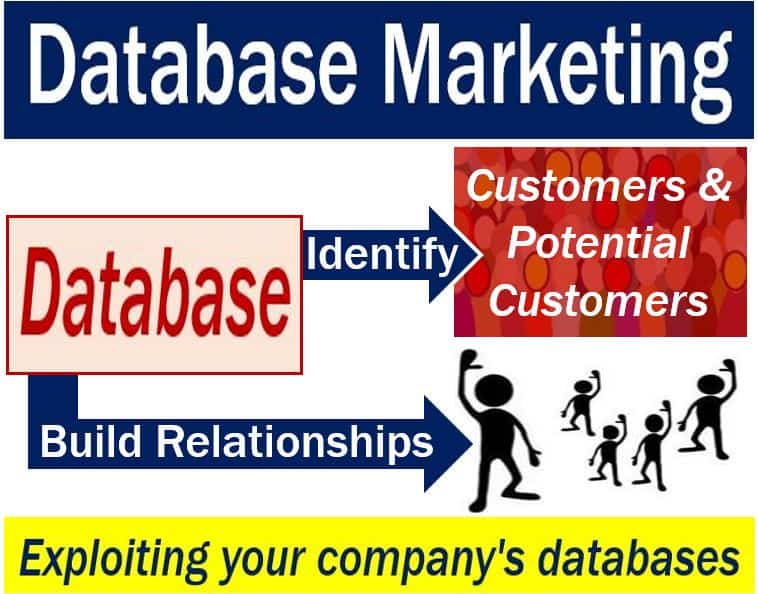Database marketing is a technique companies use to obtain and analyze as much information as they can about their customers. Companies do this so that they can tailor their plans and sales decisions. It is one of the many subdivisions of marketing.
Put simply; database marketing uses customer databases to generate personalized communications to boost sales.
In other words, you build up a database which allows you to identify customers. You then build a relationship with them that will help increase your sales.
Computer database technologies keep information about customer characteristics. They also keep data on how customers interact with the company.
This data can determine the long-term value of these customers to the company. The information is useful for predicting the lifetime value of a customer on an on-going basis.

According to the American Marketing Association, database marketing is:
“An approach by which computer database technologies are harnessed to design, create, and manage customer data lists containing information about each customer’s characteristics and history of interactions with the company.”
An important concept behind marketing is converting strangers into contacts. You then turn the contacts into customers.
Database marketing – storing data
Companies store data on their customers in a single marketing database.
Typically, marketers compile this information from catalog inquiries, email requests, warranty cards, and order information. The also use direct-mail data.
Database marketing is part of a company’s direct marketing effort. In other words, it improves the relationship a company has with its customers.
Maintaining and establishing a good relationship with customers helps companies boost customer retention. In fact, customer retention is a vital factor for growing a sustainable business.
Database marketing does this by sending the right message to a specific audience.
You can use database marketing for market research, and to create reward programs for loyal customers.
The benefits of database marketing include increased profits – through improved target marketing efforts – and more sales.
Additionally, using database marketing allows companies to cut down on waste and avoid unprofitable market segments.
Database marketing fundamentals
There are four fundamentals to database marketing:
1. Determine what data you want to know
Any database will do to get you started. You should convert past records into a database if you haven’t done so already. Starting a database is better than having no database at all.
2. Update the database
Setting up a database and not updating it is pointless. So, be sure to add information on a consistent basis.
3. Analyze the data
4. Act on the data
You must act on the data that you have analyzed to extract customer information. For example, you can cross-reference the information to determine what customer purchasing habits are.
Database marketing and the law
Since the 1980s, database marketing has mushroomed into a mega-business. It has also come under growing scrutiny from privacy advocates and government regulators.
The European Commission has set up a set of data protection regulations. These regulations determine how businesses can use customer information.
In the United States, there are several state and federal laws, including the Fair Credit Reporting Act (FCRA) and the Health Insurance Portability and Accountability Act (HIPAA).
There are also programs that enable consumers to suppress their phone numbers from telemarketing.
